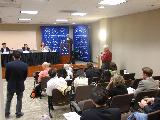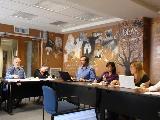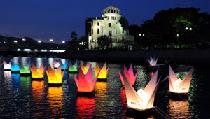| Organizers |


|
|
|
Dear
Friends and Supporters of Article 9,
We
are pleased to send you some information about the Global Article 9
Campaign to Abolish War's recent activities and related developments,
as well as an update about our upcoming event in Costa Rica.
|
|
ARTICLE 9 AND ARTICLE 12 CONFERENCE
-- PEACE CONSTITUTIONS FOR GLOBAL DISARMAMENT
A year after the Global Article 9 Conference to Abolish War that was
held in May 2008 in Japan, an international follow-up event will take
place as follows:
Date: July 9-10, 2009
Venue: On board Peace Boat (SS Oceanic)
Location: Puntarenas, Costa Rica
On
the basis of last year's achievements, the upcoming conference will
explore the value of Article 9 of the Japanese Constitution and of
Article 12 of the Costa Rican Constitution in their historical
perspectives and contemporary contexts, as well as their regional
significance. Indeed, Article 9 of the Japanese Constitution has been
considered as the foundation for Northeast Asian security, while
Article 12 inspired Ecuador, Bolivia, and the Union of South American
Nations (UNASUR) to adopt peace clauses, creating a growing momentum in
the region. As the Peace Constitutions of Japan and Costa Rica have
prevented both countries from experiencing war since their adoption,
ways of preserving them locally and promoting them globally will be
discussed.
Furthermore, in light of the current financial and
food crises, as well as violent conflicts and massive poverty that
ravage the world today, the conference will look at the links between
these peace clauses and Article 26 of the United Nations Charter, which
calls for the establishment of a system for the regulation of armaments
with the least diversion of the world's human and economic resources
for armaments in order to promote the establishment and maintenance of
international peace and security.
Building upon its history of
using military budget for education after disbanding its army, Costa
Rica initiated a debate in the UN Security Council on collective
security and armament regulation in November 2008.
Welcoming the
Costa Rican initiative, the conference will discuss its significance
and explore how to develop and synergize national, regional and global
efforts towards shifting priorities by which resources are allocated.
It will advocate for a decrease in military expenditures to invest in
financing sustainable development and human security. Participants will
conclude by adopting a declaration, possibly proposing a UN resolution
acknowledging the role Peace Constitutions play in promoting global
disarmament.
** English will be the working language of the conference. Translation between Spanish and Japanese may be provided.
Fore more information, including on how to participate, please contact us at article-9@peaceboat.gr.jp
The
event is being co-sponsored by the Global Article 9 Campaign to Abolish
War, Peace Boat, IALANA - Latin America Branch, and the Faculty of Law
of the University of Costa Rica.
|
THE FUTURE OF THE SIX-PARTY TALKS
On
May 11, a panel discussion co-sponsored by Sejong Society of Washington
DC and the Institute for Policy Studies was held at Johns Hopkins
University, in Washington D.C. on "The Future of the Six-Party Talks -
A view from civil society."
 Experts
and activists from South Korea, Japan and the US shared their insights
on how to resume the stalled Six-Party Talks (SPT), work towards the
denuclearization of the Korean peninsula, and bring about peace in
Northeast Asia. Experts
and activists from South Korea, Japan and the US shared their insights
on how to resume the stalled Six-Party Talks (SPT), work towards the
denuclearization of the Korean peninsula, and bring about peace in
Northeast Asia.
Cheong Wooksik from Peace
Network (South Korea) advocated for a new approach to North Korea based
on 'audacious engagement' and 'restraint deterrence' that would
simultaneously address the concerns of the US, North Korea, and other
parties in the SPT while reducing the US-led military power and
preparedness against North Korea parallel to the denuclearization
process.
Kawasaki Akira from Peace
Boat and the Global Article 9 Campaign (Japan) emphasized the need to
pursue confidence-building measures and promote conflict prevention in
Northeast Asia, and promote a less military-dependent security
mechanism in the region.
Indeed, the
Northeast Asian civil society is strengthening its call for new
perspectives for a lasting peace mechanism in the region. The Northeast
Asian network of Global Partnership for the Prevention of Armed
Conflict (GPPAC) promotes a civil society forum in parallel to the
governmental Six-Party Talks. Global Article 9 Conference to Abolish
War was successfully organized in Japan in May 2008, in declaring that
the war-renouncing Japanese Peace Constitution should be utilized as a
shared norm to build a peace mechanism in the region.
 In
addition to this public discussion on the future of the Six-Party
Talks, the Pacific Freeze Campaign held a closed strategic meeting
during which key activists from the US, Japan, Korea and Europe
exchanged views on the important role played by civil society in
pushing towards the reduction of military spending at the grassroots,
national, regional and international levels. A clear synergy emerged
between the different campaigns and the Global Article 9 Campaign to
Abolish War. In
addition to this public discussion on the future of the Six-Party
Talks, the Pacific Freeze Campaign held a closed strategic meeting
during which key activists from the US, Japan, Korea and Europe
exchanged views on the important role played by civil society in
pushing towards the reduction of military spending at the grassroots,
national, regional and international levels. A clear synergy emerged
between the different campaigns and the Global Article 9 Campaign to
Abolish War.
This
series of meetings could not have been timelier, as on May 25-26, the
Democratic People's Republic of Korea (DPRK) conducted nuclear tests,
threatening peace and security in the Northeast Asian region and
internationally. The international community strongly condemned
Pyongyang's move, for it runs the risk of increasing arms race in the
region.
Read an in-depth analysis by John Feffer of Foreign Policy in Focus, here.
Also read Peace Boat's reaction to the North Korean nuclear tests, here.
For more information, you can visit the following websites:
Institute for Policy Studies
Pacific Freeze Campaign
Peace Boat
Peace Network
Sejong Society of Washington DC |
NOBEL PEACE LAUREATES APPEAL FOR NUCLEAR WEAPONS ABOLITION
 This
month, a group of 17 Nobel Peace Laureates released an appeal to world
leaders to take action for eliminating nuclear weapons. Among the
signatories figure current presidents Oscar Arias from Costa Rica and
José Ramos-Horta from East Timor, former presidents Kim Dae-jung from
South Korea and Frederik Willem de Klerk from South Africa, as well as
IAEA's Mohammed ElBaradei and the Dalai Lama, among others. This
month, a group of 17 Nobel Peace Laureates released an appeal to world
leaders to take action for eliminating nuclear weapons. Among the
signatories figure current presidents Oscar Arias from Costa Rica and
José Ramos-Horta from East Timor, former presidents Kim Dae-jung from
South Korea and Frederik Willem de Klerk from South Africa, as well as
IAEA's Mohammed ElBaradei and the Dalai Lama, among others.
The
initiative of issuing such declaration was taken by 1976 Nobel Peace
Laureate and long-time supporter of the Global Article 9 Campaign
Mairead Maguire, after she visited Hiroshima to participate in the
Global Article 9 Conference to Abolish War in May 2008.
Known
as the Hiroshima-Nagasaki Declaration of Nobel Peace Laureates, the
document deplores that little progress has been by nuclear weapon
states to fulfill their obligations under the Non-Proliferation Treaty
(NPT) and expresses concern at the renewed threat of proliferation by
non-nuclear weapon states.
Just a year away from the NPT
Review Conference, the Nobel Peace Laureates urge world leaders to
seize the momentum and echo US President Barak Obama's appeal for a
nuclear free world, put an end to nuclear proliferation, and set the
course towards abolition.
The declaration calls for "a new
manner of thinking" and insists "eliminating nuclear weapons is indeed
a possibility". Praising the efforts made by Hiroshima and Nagasaki
A-bomb survivors and the processes that succeeded in banning landmines
and cluster bombs, the Nobel Peace Laureates urge citizen of the world
to press their leaders to come together to advance nuclear disarmament
towards abolition.
Read the full Hiroshima-Nagasaki Declaration of Nobel Peace Laureates, its background and messages by Nobel Peace Laureates, here.
Picture credit: Hiroshima Peace Media Center
|
HOW LAWYERS AROUND THE WORLD CAN MAKE USE OF ARTICLE 9
A
book based on the Special Forum: International Lawyers' Panel held
during the Global Article 9 Conference to Abolish War in May 2008 has
been recently published.
 The
book features transcripts of speeches by lawyers from around the world
such as Lee Jung hee of South Korea/MINBUN - Lawyers for a Democratic
Society; Robin Alexander of The National Lawyers Guild of USA; Roland
Weyl, France/International Association of Democratic Lawyers; Rifat
Moustafa, Syria/Arab Lawyers Union; Augustin Kemadjou,
Cameroon/International Association of Democratic Lawyers; Carlos Vargas
Pizarro, Costa Rica/International Association of Lawyers Against
Nuclear Arms (IALANA) and several distinguished Japanese lawyers. The
book features transcripts of speeches by lawyers from around the world
such as Lee Jung hee of South Korea/MINBUN - Lawyers for a Democratic
Society; Robin Alexander of The National Lawyers Guild of USA; Roland
Weyl, France/International Association of Democratic Lawyers; Rifat
Moustafa, Syria/Arab Lawyers Union; Augustin Kemadjou,
Cameroon/International Association of Democratic Lawyers; Carlos Vargas
Pizarro, Costa Rica/International Association of Lawyers Against
Nuclear Arms (IALANA) and several distinguished Japanese lawyers.
It
also examines the Nagoya High Court's historic April 2008 ruling that
the Japanese Air Self-Defense Force's airlifting of multinational
combat troops into the war zone of Baghdad is unconstitutional because
it is an act integral to other countries' use of force, and features an
examination of the right to live in peace from a diverse range of legal
perspectives.
The book (in Japanese language only) is available from Amazon Japan, here.
|
|
ARTICLE 9 EVENT IN TORONTO
On
May 15, the Toronto Article 9 Event Committee hosted an event "Article
9 of the Japanese Constitution: Bringing Peace to Today's World" at
OISE Ontario Institute for Studies in Education), the University of
Toronto.
 The
event was well attended by over 80 participants, including students and
faculties of the University of Toronto, local peace activists and
journalists, and a few participants from out of town. The
event was well attended by over 80 participants, including students and
faculties of the University of Toronto, local peace activists and
journalists, and a few participants from out of town.
Overall, the event was a great success. For a full report, please see the Peace Philosophy Centre's website here.
|
|
|
|
Thank you for your interest in and support for the
Global Article 9 Campaign to Abolish War.
Peace,
|
Newsletter Editor:
Celine Nahory
International Coordinator
Global Article 9 Campaign to Abolish War / Peace Boat |
|
|